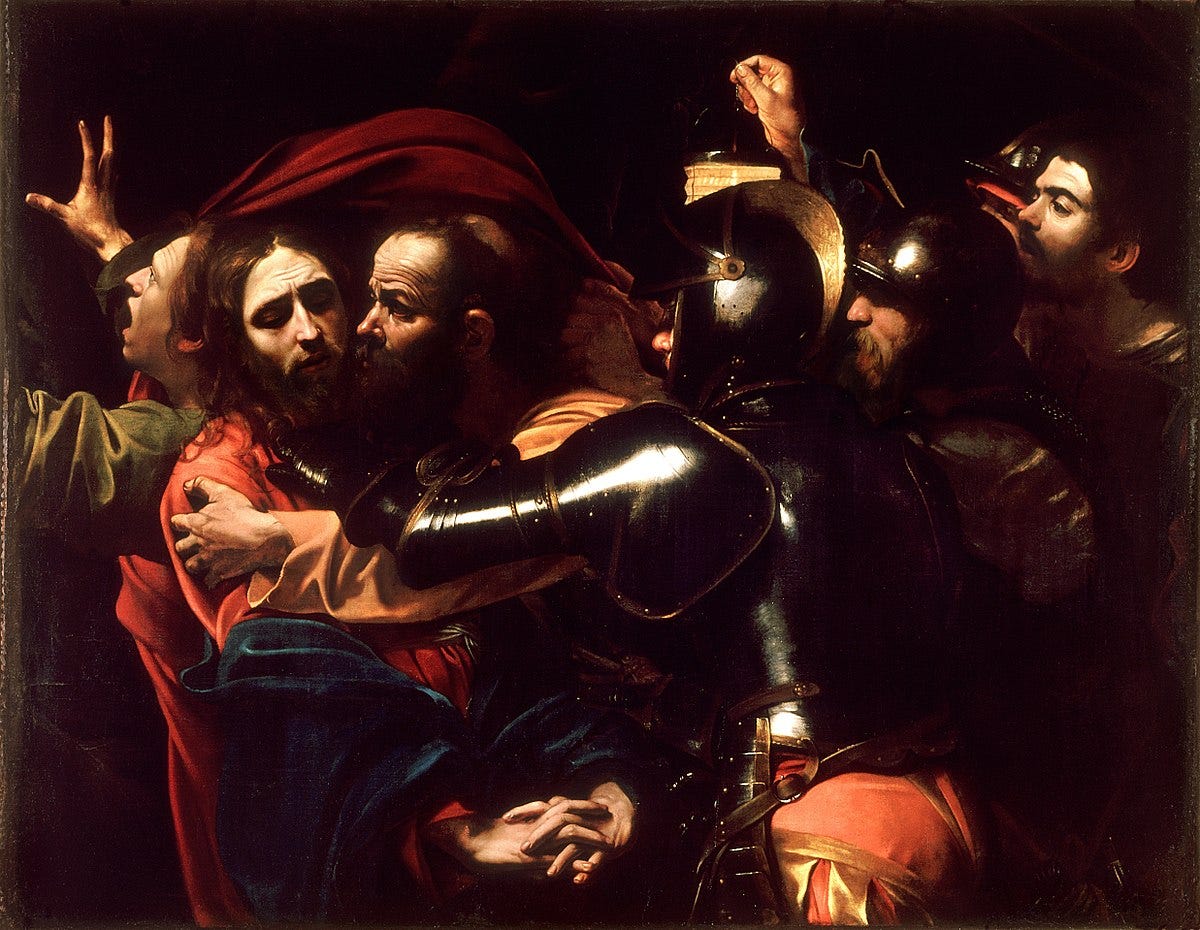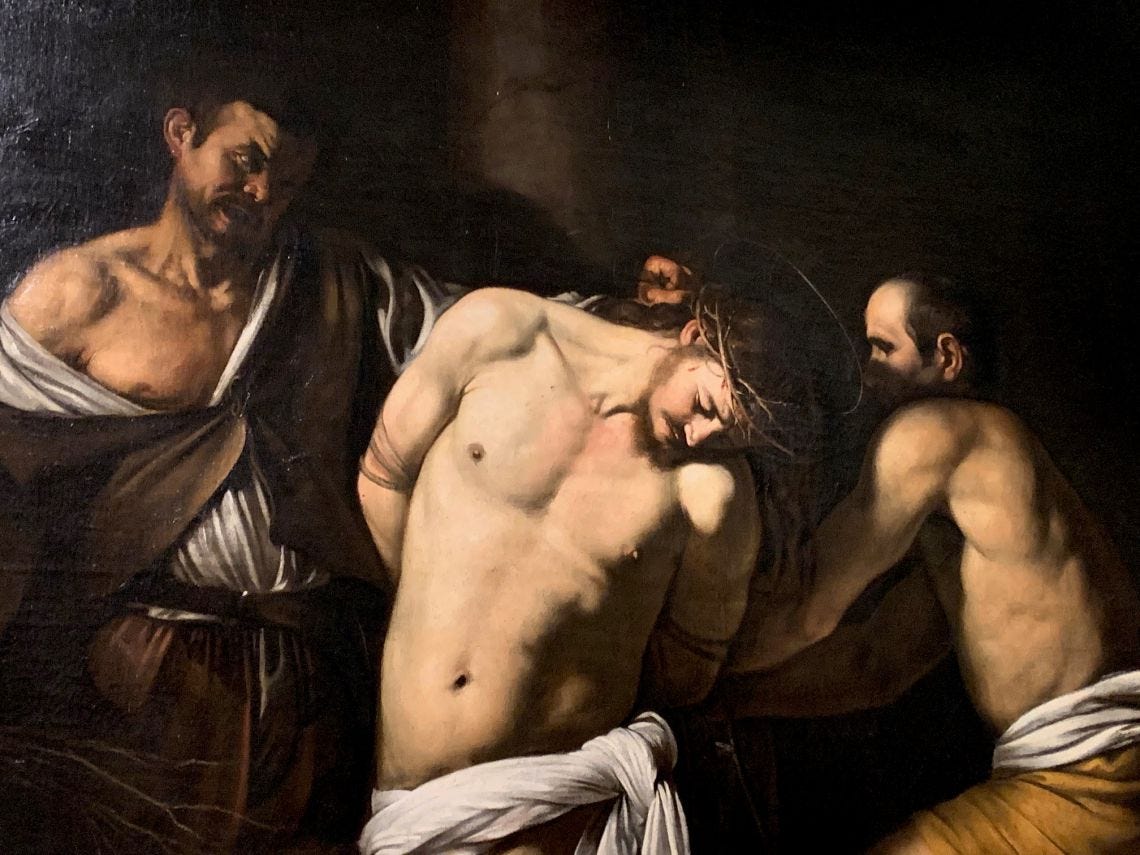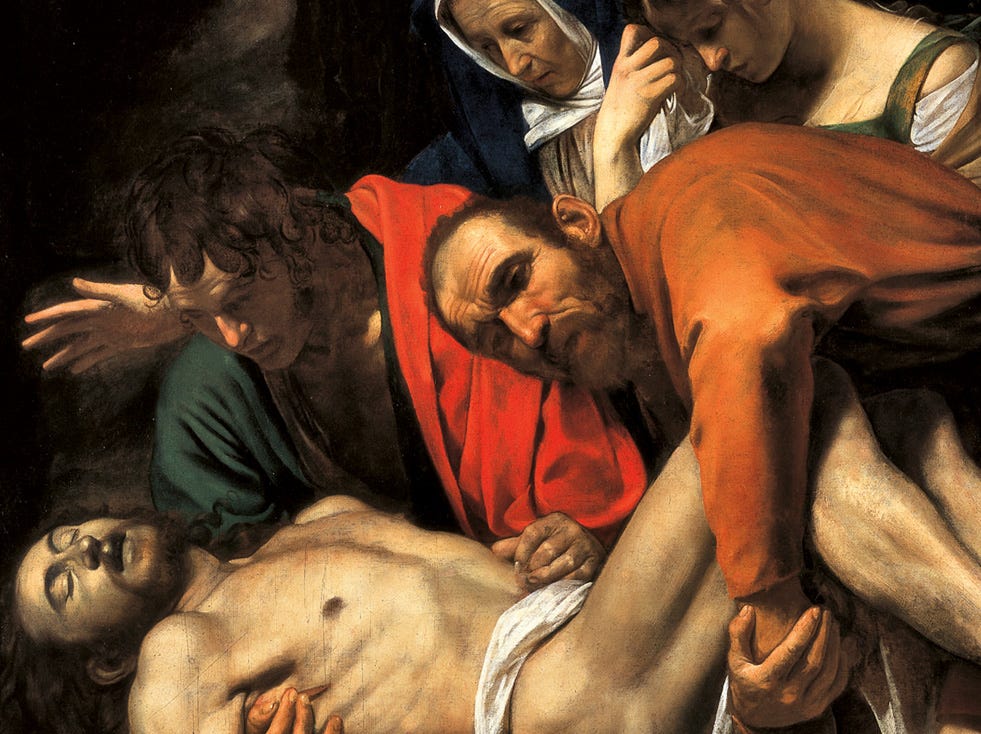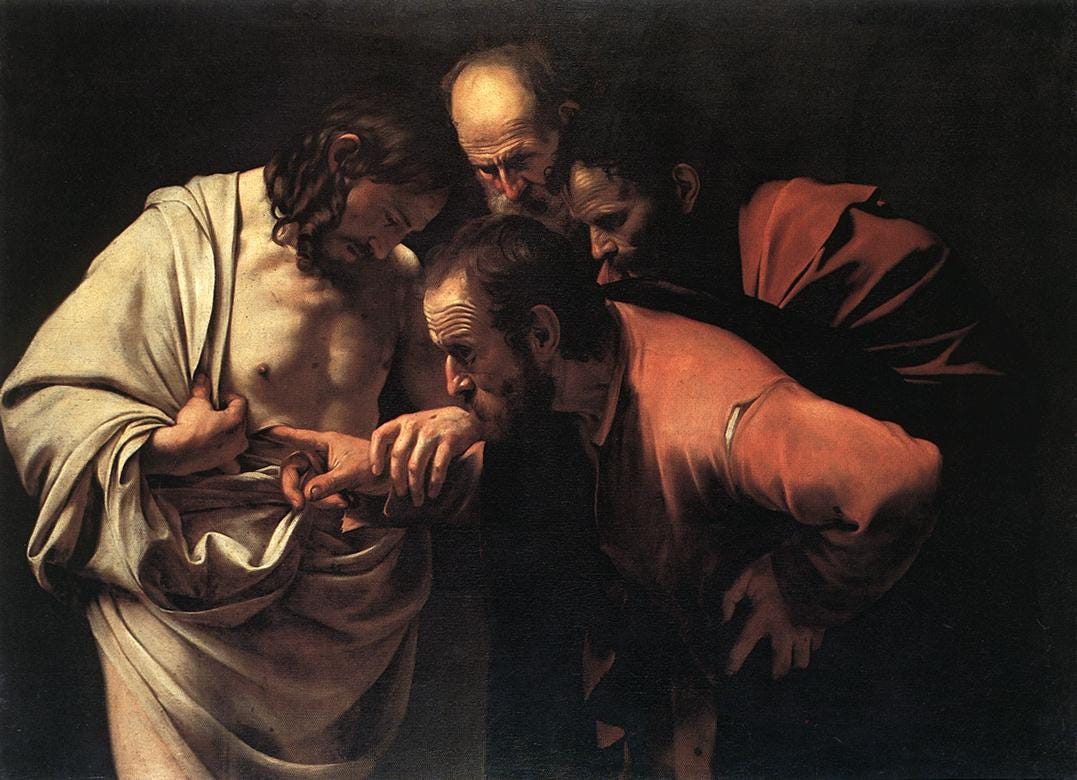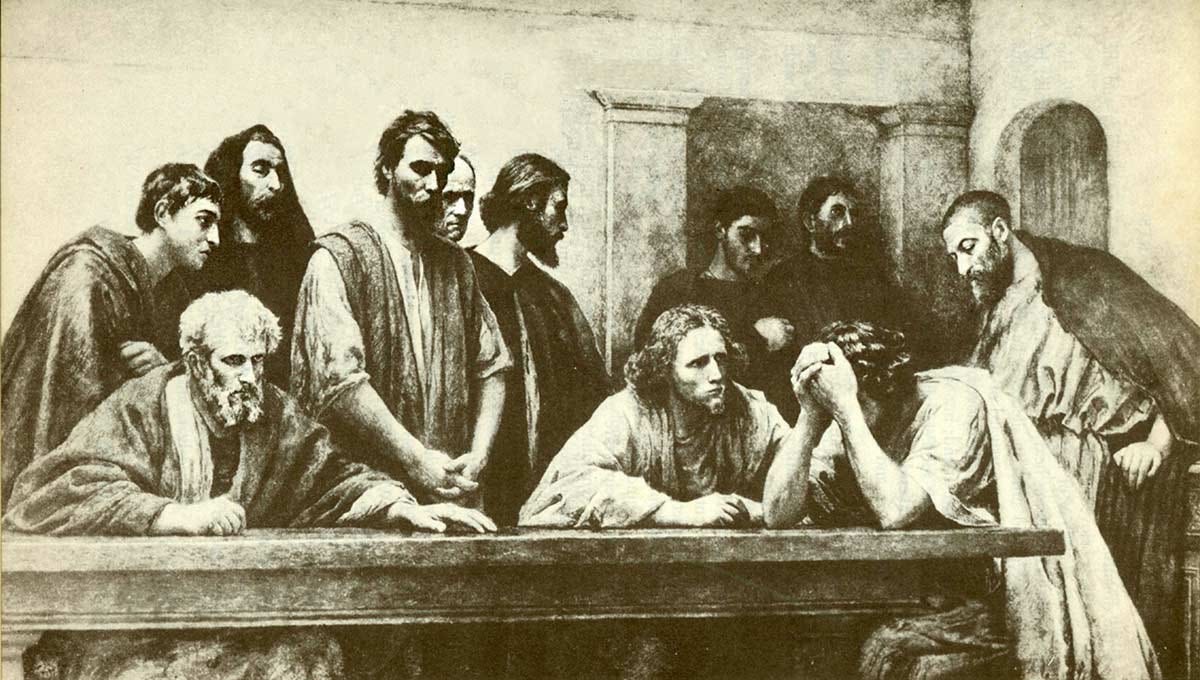Dear Reader,
I had a different edition of Second Drafts planned for this week, mostly due to reader response to last Saturday’s “repentage” (a word one of you coined that I promised myself I would use).
However, as today is Good Friday and this weekend is Easter, I’m going to exercise editorial privilege and go a different direction. Don’t worry, though—whether you agreed or disagreed as to the purpose and need for last week’s missive, I look forward to sharing the comments and doing a better job unpacking my point with you next Friday than I did last Friday. Stay tuned.
But not this weekend…not today. I have many different readers coming from many different perspectives concerning God, Jesus, Easter, etc. If you are agnostic or atheist, would you give this week’s edition an honest read? I know it’s asking a lot, but if something resonates with you (even the smallest of things) would you let me know? I’d love to hear your thoughts.
I hope you have a meaningful Easter weekend. As always, thanks for reading Second Drafts.
Craig
Programming Note for Subscribers
For paid subscribers, look for this month’s Second Drafts podcast tomorrow, in which Peaches and I sit down with friend, Peter Stewart, Senior Vice President of School Development for Stride Learning, to get his take on what he’s seeing all over the country in terms of K-12 education and why school choice may be a solution to much of what ails us.
We talk about how non-traditional, non-government schooling options have recently exploded due to Covid, partisan politics, and parental preferences, as well as what he’s learned in a career spanning 30+ years in a variety of educational roles, schools, and locations.
For those who have yet to subscribe, just $5/month gets you full access to past and future podcasts and book reviews. Decide it’s not worth it? Cancel anytime, no questions asked.
Hot Takes
I confess I’m a little burned out on Hot Takes of late. Have your people email my people if there’s something specific you want a thought on for this week. Thanks.
God’s Friday
“The Crucifixion and other historical precedents notwithstanding, many of us still believe that outstanding goodness is a kind of armor, that virtue, seen plain and bare, gives pause to criminality. But perhaps it is the other way around.”
Mary McCarthy, novelist, atheist
I grew up thinking Good Friday was the day I had to be really, really good. Good Friday was, after all, when Jesus died for my sins, and wouldn’t it add insult to injury after the fact if I sinned more than normal on this particular day?
That’s what I thought Lent was all about, too—strengthening my “good” muscles in preparation to pump some serious “good” throughout Holy Week and especially on Good Friday. As a (then) Methodist, we even had a pre-Good Friday warm-up in Maundy Thursday, which I always thought of as a short “evening practice” before the big day.
After all, if Jesus was crucified on the cross, and Good Friday was when we observed that redemptive-historical event, then surely I needed to be at my best and worth dying for at least one day out of the year.
You laugh, but you can see how this rationale—as messed up as it is—could make sense; after all, what else is really “good” about Good Friday? Our Creator—incarnate as human—comes to earth, lives a perfect life, and is unjustly accused by a less than innocent bunch of corrupt government officials, power-hungry religious leaders, and one far-too-easily swayed populous. He is mocked, tortured, and crucified between two true criminals, dies and bears the full brunt of God the Father’s justice and wrath against man for his sin and complete and utter wrecking of all he had created.
Honestly, just what is “good” about any of this?
Good News
Here’s my answer: Good Friday is Good Friday because Good Friday was God’s Friday.
That sounds good, doesn’t it? It’s clever; a little bit of a word play. Linguistically speaking, our ears like the alliteration, and the philologist in all of us appreciates the fact that the phrase “Good Friday” could clearly (and probably did) come from the phrase “God’s Friday,” just as “goodbye” comes from “God be with you.”
But reading the passages and examples from Luke 22, it sure doesn’t seem it was really “God’s Friday” at all. Actually, it seems like it was anything BUT God’s Friday. Why? Because everyone involved had an agenda for what the day we have come to know as “Good Friday” would be. For instance, Luke tells us:
how the chief priests and the teachers of the law were looking for an opportunity to kill Jesus
how Judas took advantage of this hot betrayal market and sold Jesus out
how the disciples kick-started their campaigns as to which of them was or might be the greatest
how Simon Peter took the opportunity to show off in front of the others with a boisterous, dramatic oath of loyalty to Jesus
how the rest of the disciples (probably egged on by Peter’s promise) vowed their allegiance to defend Jesus to the death, so much so that Jesus finally had to rebuke them and tell them “Enough already!”
The point is, everybody was an opportunist; everybody had a plan. And this did not stem from merely an “immature jealousy” in the case of the Pharisees; or a “well-intentioned taking of matters into his own hands” in the case of Judas; or a “noble declaration of loyalty” in the case of Peter; or an “innocent misunderstanding of greatness and servanthood” in the case of the disciples (he had just washed their feet to model what he was teaching – how could they miss that?).
These opportunistic attitudes—and the actions that followed—stemmed from a deep, calculating sin nature whose idols were power, control, being first, and being praised. Everybody had an agenda.
Just like you and I do.
Humbly Surrendering to God
But then we come to Jesus in Luke 22:39-46:
“Jesus went out as usual to the Mount of Olives, and his disciples followed him. On reaching the place, he said to them, ‘Pray that you will not fall into temptation.’ He withdrew about a stone's throw beyond them, knelt down and prayed, ‘Father, if you are willing, take this cup from me; yet not my will, but yours be done.’ An angel from heaven appeared to him and strengthened him. And being in anguish, he prayed more earnestly, and his sweat was like drops of blood falling to the ground. When he rose from prayer and went back to the disciples, he found them asleep, exhausted from sorrow. ‘Why are you sleeping?’ he asked them. ‘Get up and pray so that you will not fall into temptation.’”
They had just had the Last Supper and gone for a walk on the Mount of Olives, into the Garden of Gethsemane. Probably because of their disturbing discussions earlier, Jesus warned the disciples about falling into temptation—not resisting sleep, but resisting humility; not failing to stay awake, but failing to stay surrendered to God.
Sound familiar? It should. These were what Jesus prayed for himself in the Garden.
Why would Jesus need to pray for these things (or even at all) if he was the Son of God? I would suggest there’s a whole lot more within Luke’s recording of Jesus’ prayer of “Father, if you are willing, take this cup from me; yet not my will, but yours be done” that we should consider.
What’s my clue? There are a couple:
First, the Scripture says that an angel appeared to strengthen him, which is similar to when Jesus was physically exhausted after resisting Satan’s three temptations in the desert earlier in the gospels.
Second, Luke says that Jesus was “in anguish,” and that “his sweat was like drops of blood falling to the ground” as a result. Blood or “like” blood, that’s not the point; the point is Jesus’s prayer was more than a calm, cool, and collected “Thy will be done.”
Jesus—in his humanity—looked forward to being crucified about as much as you or I would. More than that, Jesus knew he would be separated from the love and fellowship of the Father he had always known in his deity from before time began. Neither of these options seemed pleasant ones, which is why he asked the Father if there was another. There wasn’t.
Luke tells us that when he rose from prayer and went back to the disciples, he found them asleep. What did Jesus say to them? The same thing he had said before: “Pray so that you will not fall into temptation.”
These words were as much for him as they were for them. Could it be that, because of his humanity, Jesus knew that he could resist humility; that he would need to pray to stay surrendered to God?
Does this sound too doctrinally dangerous, as if Jesus could have skipped town and ruined God’s plan of redemption? Am I making Jesus too human? Listen to chapter 5, verses 7-9, of the New Testament book of Hebrews:
“During the days of Jesus' life on earth, he offered up prayers and petitions with loud cries and tears to the one who could save him from death, and he was heard because of his reverent submission. Although he was a son, he learned obedience from what he suffered and, once made perfect, he became the source of eternal salvation for all who obey him.”
Loud cries and tears? Learning obedience from what he suffered? You mean Jesus didn’t just happily let himself be killed because it was the right thing to do?
Real Agony, Real Pain
The agony Jesus suffered in the garden was real agony because he knew that the sin he was about to bear was real. The pain he knew he would experience wasn’t just the crown of thorns in his head or the nails in his hands or feet; it would be being forsaken by the greatest love anyone could ever know, only to be the object of the fiercest wrath anyone would never know (thankfully) because of his sacrifice.
What about the part about Jesus praying to “the one who could save him from death?” The biblical gospels and secular historians like Josephus and Tacitus all record that Jesus died on the cross, so is this a mistake? What “death” is Hebrews referring to that God saved him from?
The answer, of course, is that God saved him from eternal death, the same kind of death he saves us from because of Jesus’ death for us on the cross. That’s what we’ll celebrate on Easter—God the Father’s resurrection of Jesus the son, as well as our hope that he will do the same with us.
Which brings me back to the point that Good Friday is Good Friday because Good Friday was God’s Friday. It didn’t belong to the Pharisees, nor to Judas, nor to Peter nor to the other disciples. It didn’t belong to Satan. It didn’t even belong to Jesus, who, in his humanity, asked for special consideration as to whether there was another way to satisfy God’s wrath because of man’s sin.
No, Jesus surrendered his agenda to the Father in order to free us who are captive to our agendas, so that we might be free to surrender our agendas to the Father. Jesus died on the cross to deal with the sin in our opportunist hearts—not just our sins of power and scheming and manipulation and dishonesty, but all that accompanies our sins—guilt and shame and sorrow and hurt as well—so we can experience the same love of the Father that Jesus always has.
Not about Being Good, But about Being God’s
Good Friday is not about being good. Maundy Thursday is not about being good. Holy Week is not about being good. Lent is not about being good. Life is not about being good—and that’s good, because none of us can be good enough.
Life is about being surrendered to God in what he says is true about us—that we all like sheep have gone astray; that each of us has turned to our own way; that all of us have fallen short of his glory—and to embrace the love God still has for us despite what he says is true about us.
But this call to surrender is difficult. For those of you who may not know God, you need to surrender what it is—your pride, your will—keeping you from the reality that you are so desperate for peace. Those impure motives you can’t confess; those painful experiences you don’t know what to do with; the unquenchable desire you have for love—real love—these will not go away until you surrender yourself to God to be forgiven and accepted—even in your brokenness—because Jesus was broken for you.
For those (like me) who claim to know God and his love (though mostly on our own terms), we need to surrender our preoccupations with being good—our reputations, our behaviors, our “better than thou” mentalities—and come to trust the fact that we’re surrendered enough because Jesus surrendered for us. When we don’t read our Bibles every morning, when we forget to pray, when we choose—yes, choose—to sin, is Jesus’ surrender on the cross enough for us? It was enough for God; who are we that it’s not enough for us?
When will we stop praying, “Oh, Lord, beat me so I’ll feel better,” and start trusting that we who are in Christ can never be more or less righteous in God’s eyes than we are right now? On my worst day, I am still “Christ in Craig Dunham.”
Who wouldn’t want this kind of assurance? Who wouldn’t want this kind of peace? Who wouldn’t want this kind of grace? We’re all opportunists at heart, right? The difference is, this is not an opportunity we take; it is an opportunity we surrender to.
From Sorrow to Surrender
As we consider Christ’s sacrifice on the cross today, let us sorrow over our sin. Let us grieve our tendencies—similar to those of the Pharisees, of Judas, of Peter, of the disciples—to be opportunists with agendas.
But as we celebrate the resurrection of Christ on Sunday, let us be hopeful that Jesus, our older brother in the faith, surrendered his will to God and went through that agony for us. Let us rejoice that God saved him from eternal death, which is the same salvation he offers each of us by way of Jesus’ surrender and sacrifice.
What’s good about Good Friday? Good Friday is Good Friday, because Good Friday was God’s Friday.
And I’m so, so thankful it was.
Post(erity): Living and Loving Accordingly
Each week, I choose a post from the past that seems apropos of something.
This week’s Post(erity) post, “Living and Loving Accordingly,” is a meditation I wrote on Holy Saturday, April 7, 2012. An excerpt:
“When I was younger (though, sadly, not that much so), I remember once reading this passage and thinking to myself, ‘Great story, but what do those of us without dramatic conversion stories do? How do those of us whose sins are not that many love much when we've not been forgiven that much?’ I even thought about writing a book about this ‘conundrum,’ for surely, I thought, there are plenty of ‘good’ Christians out there who felt as I did.
Indeed, there were...and are. And that’s the problem...with them and with me.”
Happy Easter.
Why Subscribe?
Why not? Second Drafts is a once-a-week newsletter delivered to your inbox and it’s totally free. To receive additional monthly content (podcast, book review), subscribe for $5/month.
Keep Connected
You’re welcome to follow me on Twitter.






